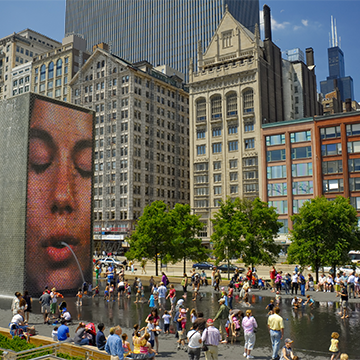Pediatric Hematology Oncology Fellowship
The Pediatric Hematology, Oncology, Neuro-Oncology and Stem Cell Transplant Fellowship at the Ann & Robert H. Lurie Children’s Hospital of Chicago accepts three fellows per year; the duration of training is 36 months. The program strives to provide trainees with a solid foundation on which to build their clinical and research career, developing key attributes such as medical knowledge, clinical and research skills, professionalism, proficiency in communication, as well as a commitment to career-long scholarship and contribution to the field. The program is accredited by the ACGME.
Video: meet Fellowship Program Director Rachel Bercovitz, MD, MS
Education
Fellows are excused from clinical duties during fellows conference, which consists of a core curriculum encompassing all sections in the division. Additional educational sessions include hematopathology, radiology conference, journal club, tumor board and morbidity and mortality conference. Fellows participate in division administrative and quality improvement activities, as well as advocacy initiatives. Divisional conferences are supplemented by a department-wide fellow’s college and ethics curriculum, grant-writing curriculum, grand rounds and firm rounds, a clinical conference in which faculty present and discuss patient cases.
Research
Fellows can expect to complete a mentored research project in clinical, educational or translational science. Those interested in a bench laboratory experience have collaboration opportunities with scientists at Stanley Manne Children’s Research Institute or the Feinberg School of Medicine. Grants funded through philanthropy are available. We anticipate that all fellows will attend and present at a national meeting during their training. Funded master’s programs are available in Clinical Investigation, Public Health, Healthcare Quality and Patient Safety and Health Services and Outcomes Research. The fellow will be introduced to the research opportunities available early in fellowship in order to have a smooth transition from the clinical first year into the second and third years, which are primarily research-based. Fellows’ progress in academic pursuits is monitored by a standing scholarship oversight committee and is based on specific milestones, as well as a timeline established in the first months of training.
Clinical Experience
The clinical experience at Lurie Children’s is comprehensive, with broad exposure to all aspects of pediatric hematology, oncology, neuro-oncology and stem cell transplantation, preparing fellows for careers in an academic pediatric setting, including the potential for further subspecialty training. Fellows care for children in the 24-bed inpatient unit along with those patients admitted to the pediatric intensive unit. The unit will expand over the next year to increase capacity to 48 beds. Consults are requested of the fellows from the general medicine service, surgical services, the emergency department and the pediatric and neonatal intensive care units. We take care of the highest volume of sickle cell, thalassemia, general oncology, neuro-oncology and stem cell transplant patients in Illinois, we schedule over 13,000 clinic visits annually. Fellows are directly supervised during common procedures, including bone marrow aspirate/biopsy and spinal taps with administration of intrathecal chemotherapy. Per the U.S. News & World Report hospital ranking system, Lurie Children’s is consistently first in Illinois and in the top 10 nationally overall; cancer care has been ranked in the top 12 in the nation in the past several years. Our patient population is racially and socioeconomically diverse.
Requirements & Eligibility
To be considered, applicants must have completed an accredited pediatric or medicine/pediatrics residency program prior to the start of fellowship training. Applicants must be board-certified by the American Board of Pediatrics or board-eligible to sit for the licensing exam during the first year of fellowship training.
International medical graduates are welcome to apply but must meet specific criteria, including a valid ECFMG certificate and documentation of U.S. citizenship or a valid green card or visa as per the requirements set forth by Northwestern McGaw Medical Center.
Application Process
Applicants may begin submitting applications through the online Electronic Residency Application Service (ERAS) in July of the year prior to the anticipated fellowship start date. Program leadership reviews applications beginning in July. The application requirements are spelled out in ERAS, but include:
- Online application
- Current curriculum vitae
- Personal statement
- Recent photograph
- Copies of USMLE or COMLEX scores
- Medical school transcript
- Three letters of recommendation, including one from the residency program director and preferably one from a member of the Division of Hematology/Oncology at the applicant’s residency training program
Due to the large number of applications we receive, all applicants are encouraged to submit their completed applications as early as possible. The program reviews applications in July. Interviews start in August and continue until October or early November.
Advocacy
Discover the many ways our faculty are impacting children's health beyond the hospital.
Global Health
Each year, as many as 20 third-year pediatric residents travel to Bugando Medical Center in Mwanza, Tanzania, to participate in an educational initiative that provides exposure to the management of complex pediatric diseases in a low-resource setting. Learn more about this extraordinary opportunity.
Why Northwestern?
 Housestaff training through McGaw Medical Center of Northwestern University provides diverse and challenging clinical experiences and world-class education located in the heart of the beautiful city of Chicago.
Housestaff training through McGaw Medical Center of Northwestern University provides diverse and challenging clinical experiences and world-class education located in the heart of the beautiful city of Chicago.
Watch Our Videos
Fellowship Life
Video Gallery
Contact Us
Rachel S. Bercovitz, MD, MS
Program Director, Pediatric Hematology/Oncology/Neuro-Oncology/Stem Cell Transplant Fellowship
Hematology, Oncology, and Stem Cell Transplantation
Elizabeth A. Sokol, MD
Associate Program Director, Pediatric Hematology/Oncology/Neuro-Oncology/Stem Cel
Hematology, Oncology, and Stem Cell Transplantation

Melissa Ortiz
Medical Education Coordinator, Hematology, Oncology and Stem Cell TransplantationFellowship
Hematology, Oncology, and Stem Cell Transplantation
(312) 227-4873
More Information
Further program details, including the housestaff manual and a sample training contract, are available on the McGaw Medical Center of Northwestern University site.
Physician-Scientist Training & Resources
We offer a wide range of resources, mentorship opportunities and formal training programs to help our residents and fellows excel as physician-scientists. Explore all of the resources and hear from housestaff who are making research a major part of their career development plans.